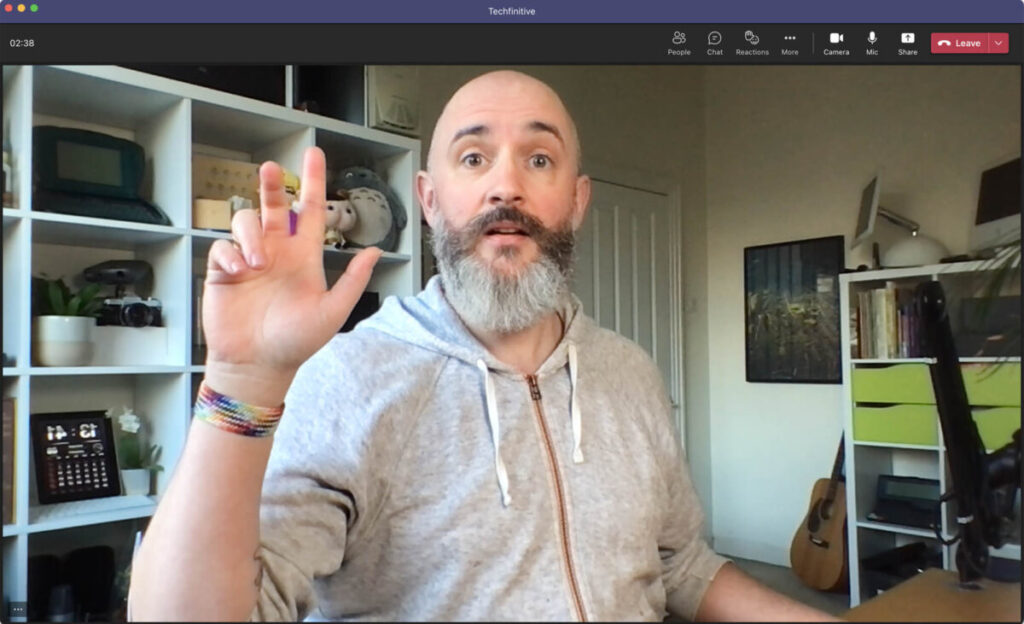
How introverts can make their voice heard on video calls
Video calls are no longer novelties for most office workers, and yet getting your voice heard can still be tricky. Some of this can be solved by tech, but the bigger challenge here is personal, and you can’t just order an extroverted personality off Amazon for £29.99.
This guide is first designed for someone who finds it hard to speak up during virtual team meetings. But it’s also to help managers understand why you find it hard, and so develop techniques to accommodate you. It’s in their interests to accommodate you, because introverts are vital to businesses. As a manager, one of your meeting priorities should be to help introverts get their points across. After all, unlike extroverts, introverts aren’t simply talking for talking’s sake.
So: read, but also do forward this to managers or leaders who you think are open to better supporting their team.
Why is it hard to speak up?
Speaking up in in-person meetings can be hard, but it can be even harder virtually. “I have a strong aversion to interrupting people,” said Ben Zanin, a senior DevOps engineer. “The audio latency in online meetings, the lack of non-verbal cues in general and eye contact in particular, and the challenge of divining when a speaker is diverging from the meeting topic and when they are just making a longer on-topic point all give me pause.”
The technology adds a huge overhead to civil servant Zoe Williams’ mental processing. “I find it hard to speak up to my team when they have their cameras off. It’s like speaking to someone when you’re both in a room together but you’re blindfolded and you can’t hear or sense that they are still in the room. I can’t tell how they are reacting or if they are even listening. Are they still there? Are they bored/disengaged/doing something else? This is really disorientating and unnatural for me.
“I find it hard to speak while looking at my own camera on my screen too. Who in life, while talking to someone else, has to look at their own face at the same time? I’ll be trying to talk but then realise my hair is a mess or I’ve got coffee down my jumper. Then I have to try and focus on the person talking while I’m processing that. I find it distracting and unnatural.”
General anxiety about ensuring you present yourself as professional and articulate is also a concern for health writer Taneia Surles. “I worry that I’ll slur my words or say something that doesn’t make any sense,” she said.

How to ensure you can get your point across
It’s important you and everyone in your team acknowledges out loud that there is a kind of interpersonal tax to online meetings, even for the most gregarious of extroverts. You must be kind to yourself, even as you work to give yourself more tools to push yourself forward.
Zoe Williams again: “Online meetings are tiring for many people, but this is made worse if your calendar is blocked out with back-to-back meetings. Schedule a five-minute break at the beginning or end of meetings to step away from your screen and get fresh air or move around or make a cup of tea. Your brain will thank you. Can you adjust your default meeting settings to start at five past the hour or end five minutes early?”
Look for support
It’s also a good idea, if you feel generally safe and supported, to talk to your manager to express both ‘that’ and ‘how’ you find online meetings tricky; indeed, if you’re fortunate, they might have picked up on this already, and created an opportunity for you to discuss.
If you are uncomfortable raising it with your manager, consider some peer support. “I once told a colleague how hard I found leading our weekly start-the-week calls,” said Zoe Williams, “and she kindly made extra effort every week after that to speak up too in the meetings to make me feel less uncomfortable.”
Planning can help you feel less flustered. This is helped if your manager is disciplined about sharing an agenda – especially one that outlines suggested time allocations per topic, and expectations about who will contribute. But that’s out of your control. As Ben Zanin says, “whenever possible, write a very brief list of points you want to introduce during the meeting, and roughly when in the agenda it might be best to do so for each one”.
How technology can help introverts be heard during conference calls
Plan Ahead
It’s also important to get the tech right, so you’re not flustered. Ensure you have enough bandwidth on your broadband connection by discouraging other users on your network. If possible, shut unused devices down.
Work out ahead of time what you’ll do if tech gremlins get in the way. This doesn’t have to be complicated. It could be: “If my internet goes down, I will text Ellie and let her know while I get it sorted”. Or, “If my laptop’s battery dies I’ll switch to Teams on my phone”. But keeping your cool when things go wrong will help you stay focused.
Have the right equipment
Ideally, everyone on the call should wear headphones to reduce dependence on echo cancellation; this can chop up someone’s speech and thus exacerbate awkwardness. A call-centre headset is a simple way to achieve this whilst improving your own audio quality.
Read Chris’ article about how to set up video calls for the best audio and video
Don’t be afraid to hack the tech too, even in messy ways, to get it to work for you. Zoe Williams, who hates seeing herself on screen, just stuck a Post-it note over the corner where her camera showed (before she worked out how to hide that in the app).
Most meeting software allows you to click an icon to virtually raise your hand. This can lessen anxiety about interrupting someone, but it comes with anxieties of its own. Still, it’s worth experimenting with. You can always physically raise your hand too!
Don’t overthink it
And finally, though we know it’s easier said than done, Taneia Surles underlines perhaps the best advice of all. “Don’t overthink it. It’s easy to get caught up in what you should or shouldn’t say, but you have the right to share your opinions just as much as everyone else.”
Advice for managers on how to help introverts during video calls
If you regularly run meetings, one of the most valuable things to explicitly remind yourself is that everyone will process and respond to information differently.
“If it’s a regular meeting, you get to know the people who contribute to discussions and those who don’t – who choose to stay silent,” said entrepreneur Viva Andrada O’Flynn. “People have different personalities, ways of learning and communicating. Just because people are silent, doesn’t mean that they’re struggling to speak up. Maybe they’re absorbing the discussions and process what’s being said without commenting.”
And don’t shame people for their different communications styles. Telling people “be assertive”, to “just speak up” or commanding “cameras on, everyone” are counterproductive, Ben Zanin pointed out. We’d say they’re often rude too.
Think about the logistics of the call
This extends to logistics. Consider this seemingly trivial example. If you ask, “Where shall we have our team lunch?” verbally and await answers, most introverts won’t speak up. If you encourage people to drop suggestions in chat, or maybe put up a poll for votes, you let more introverted folks have their say without having to turn the spotlight on themselves. A discussion may flow more naturally.
Manage expectations
Most important of all, though, get good at communicating your expectations as a team leader. Send focussed agendas out in plenty of time. Set expectations around communication during meetings – for domineering extroverts as well as introverts! “Gently, firmly discourage interruptions,” said Ben Zanin, “and encourage turn-taking.” He also makes the point that rotating duties in meetings can be productive.
Because ultimately, here’s the secret: most people don’t like online meetings. We just endure them because they allow for communication where in-person meetings would be impractical.
Final thoughts
One last thing: almost everyone we spoke to while writing this article identified both as someone who hates speaking up in online meetings but also is required to run them. Nobody is completely comfortable here. The more compassionate and empathetic we can all be to each other, the better and more productive our meetings will be.
NEXT UP

Slow buyers cause tech firms to rethink sales approaches as tough Q1 hits home
New research suggests tech sales were slow in Q1, with buyers of technology and professional services taking their time before committing to any solutions.

ByteDance says it has no plans to sell TikTok and refuses to bow to US pressure
ByteDance, the Chinese company that owns TikTok, stated that it “doesn’t have any plans to sell TikTok” on Toutiao, a social media platform that it also happens to own.

Solace Kidisil, Group COO of Nsano: “The difference between traditional finance and fintech is the questions we ask”
We interview Solace Kidisil, Group COO of Nsano, a fintech company from Ghana, offering digital payment solutions across Africa